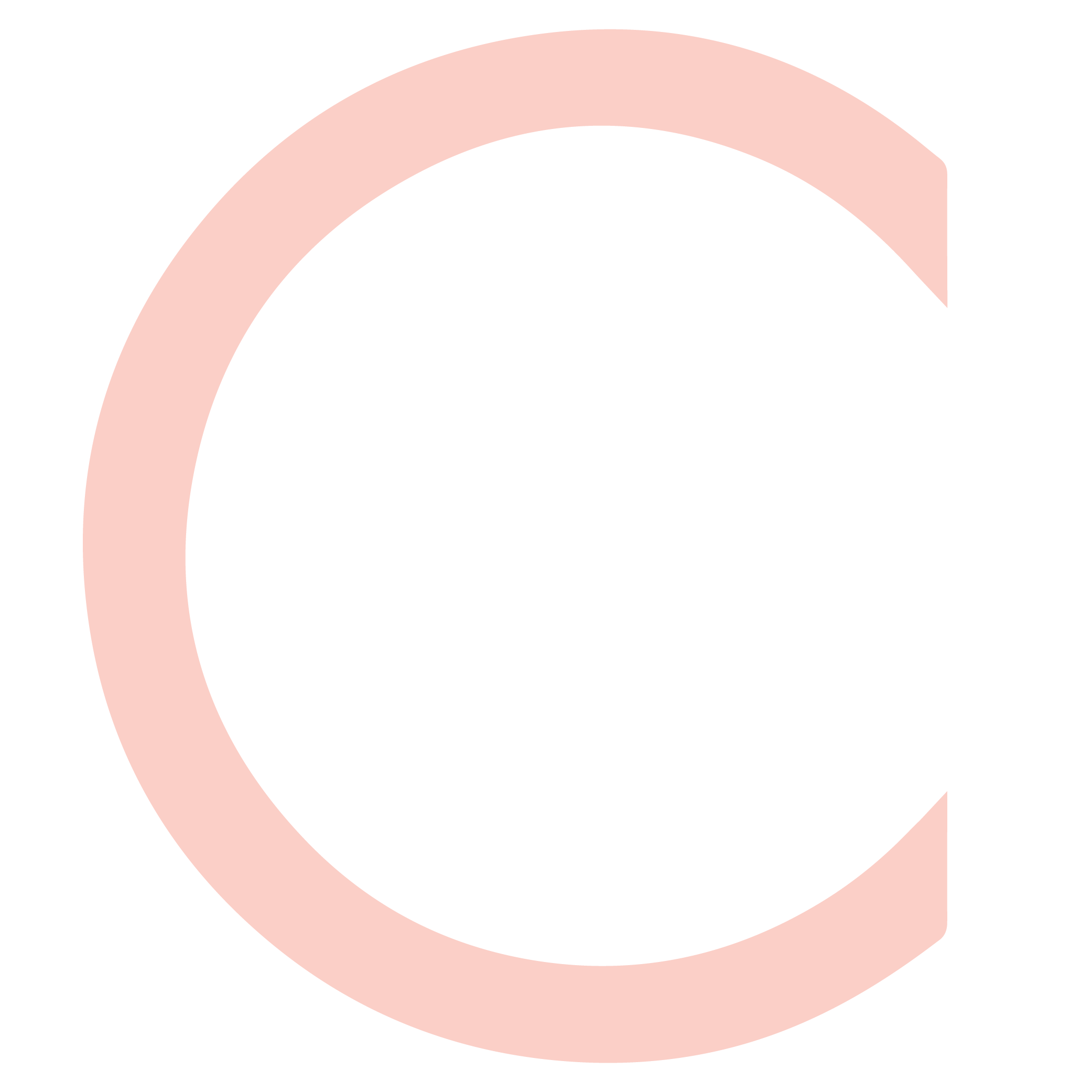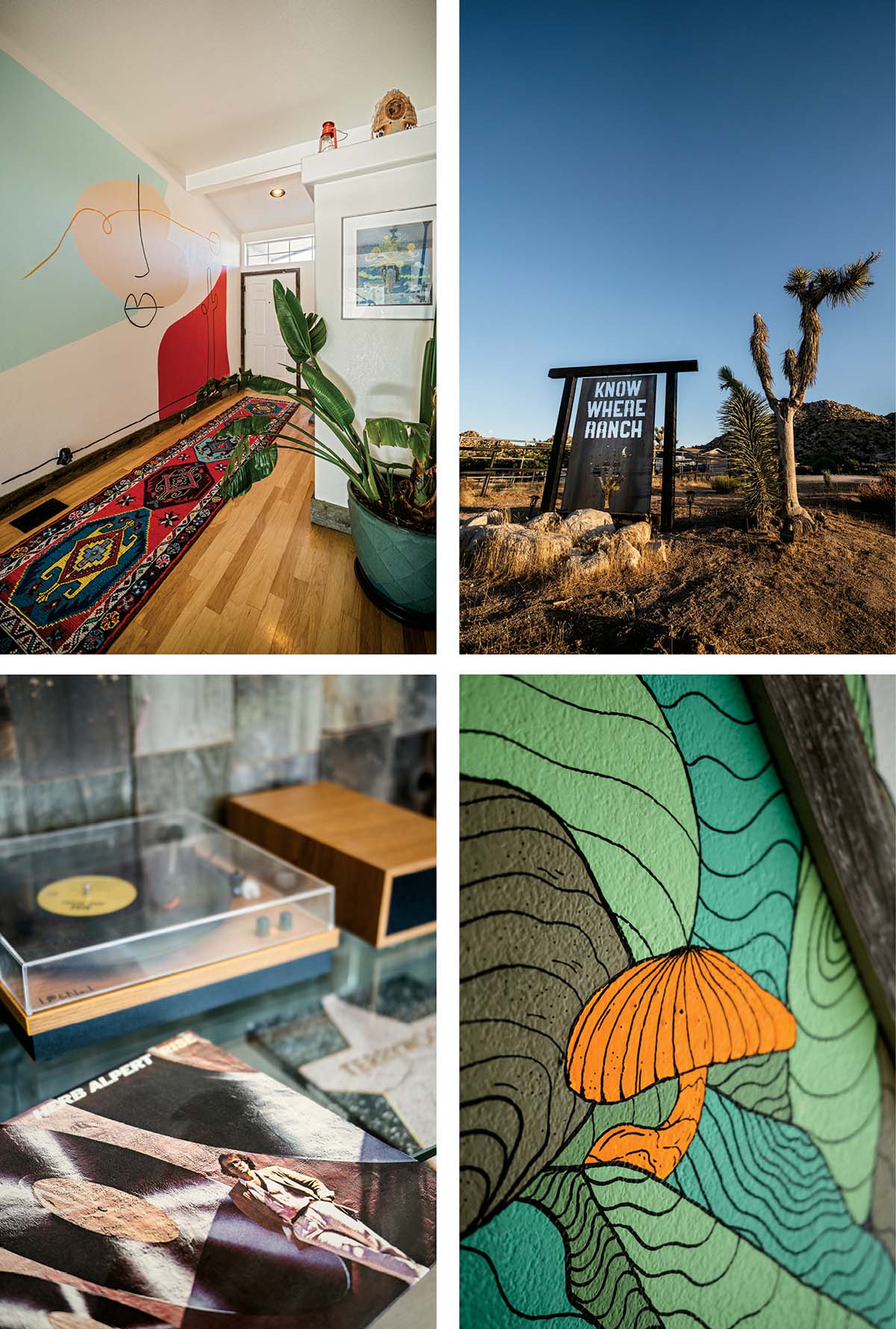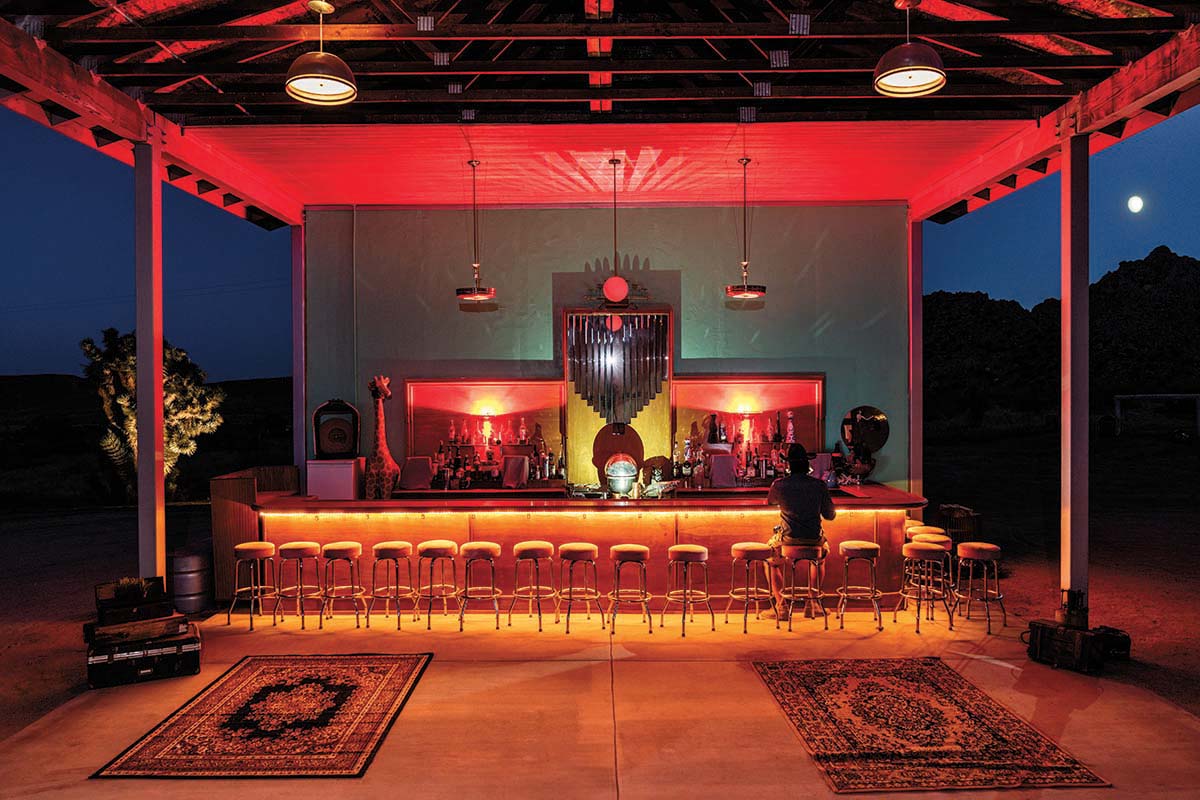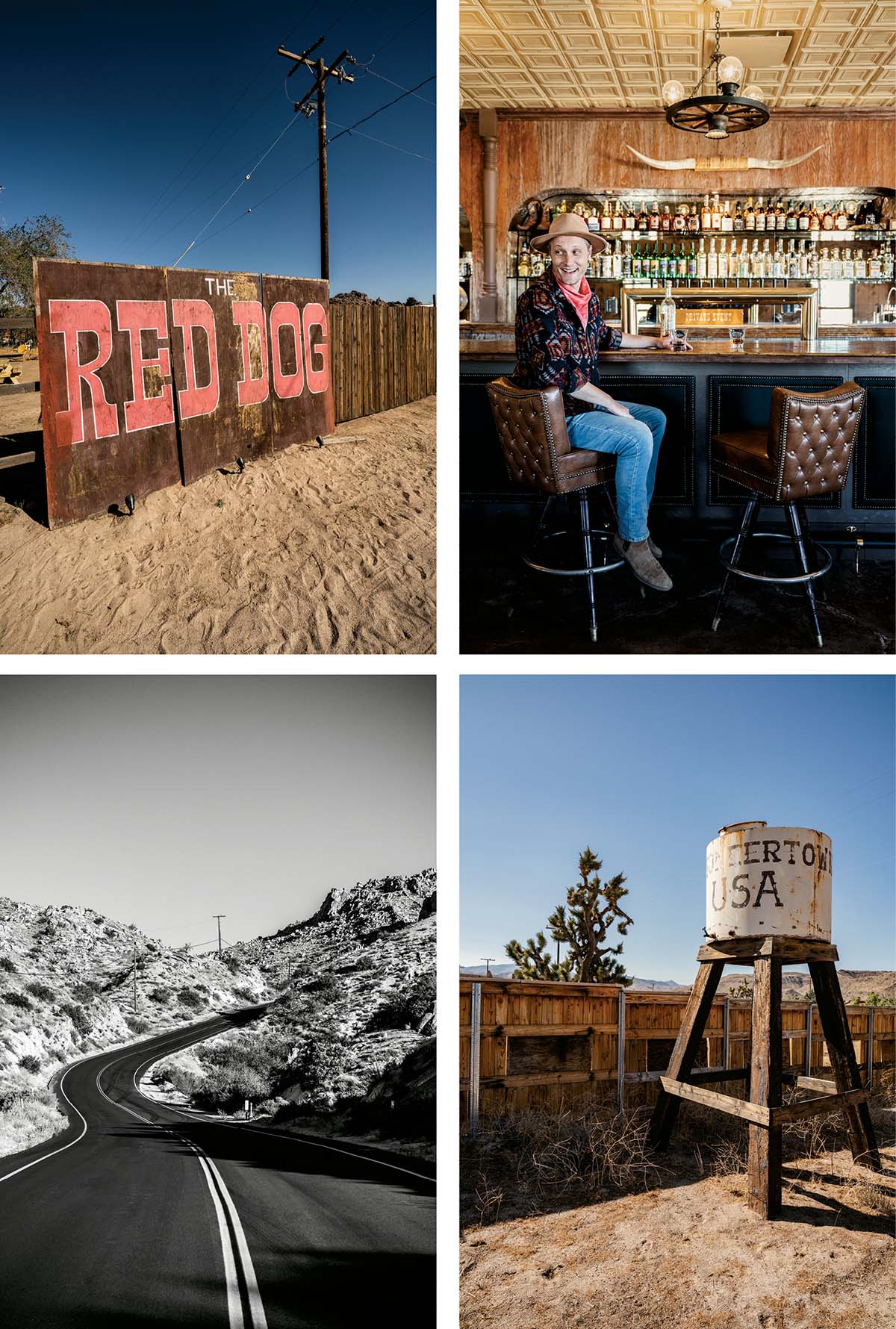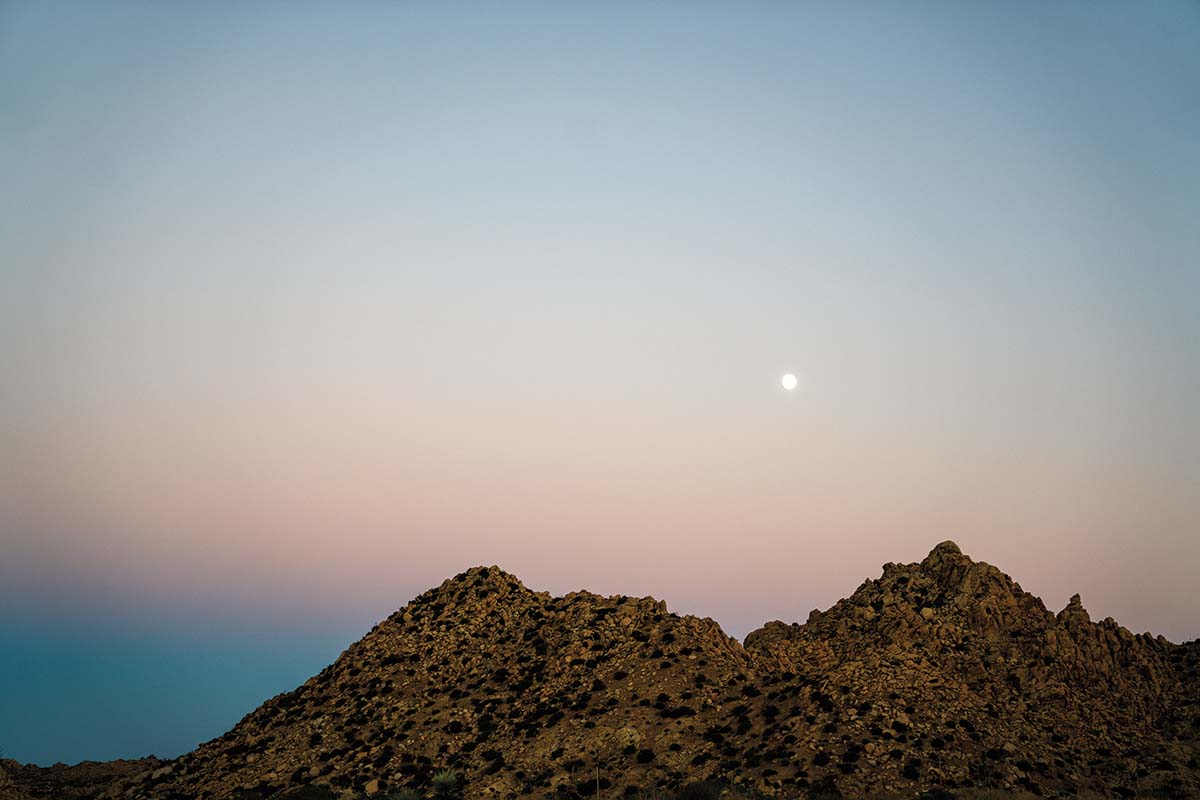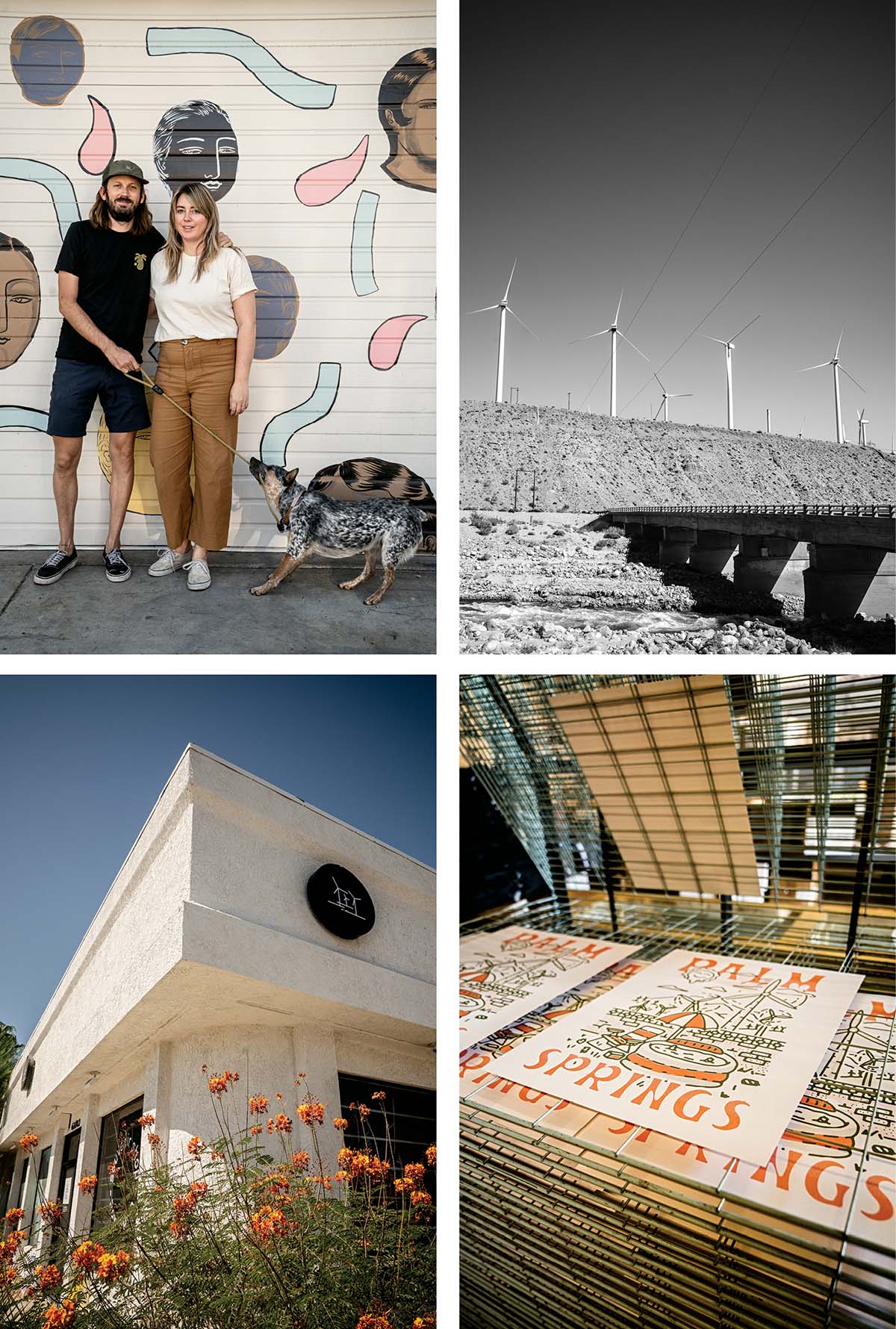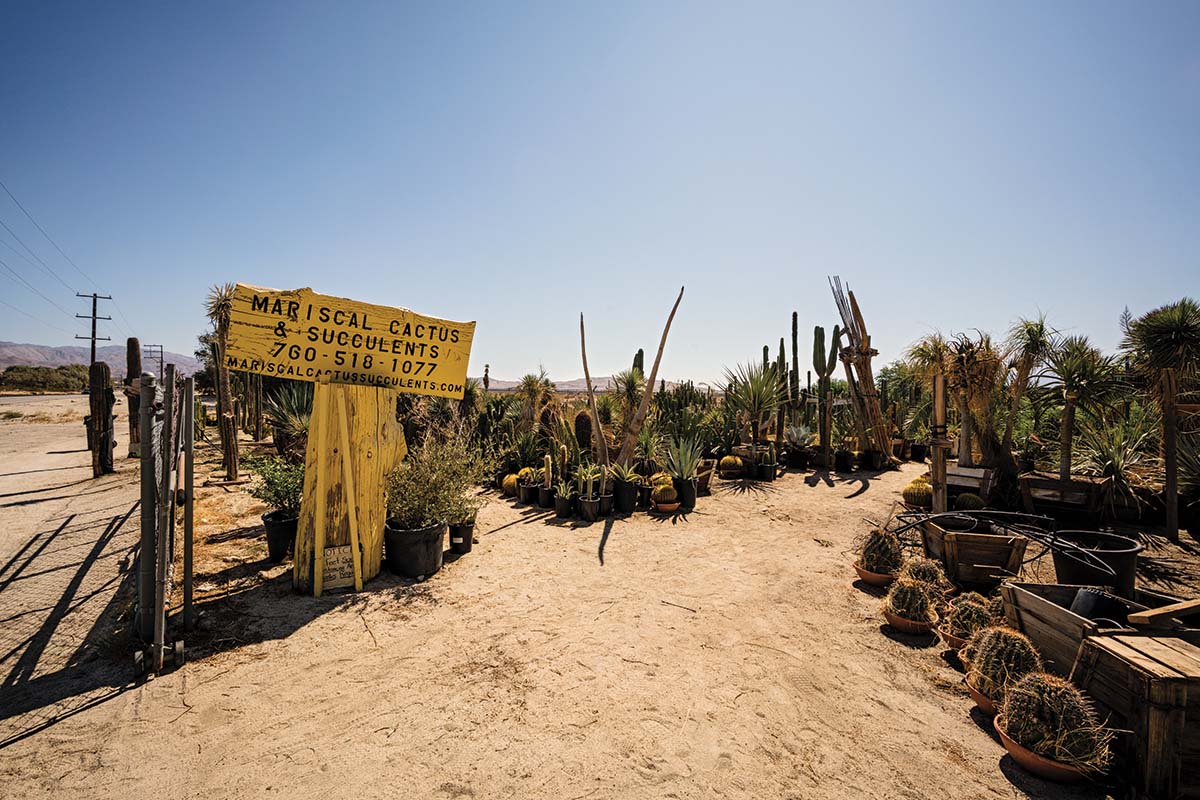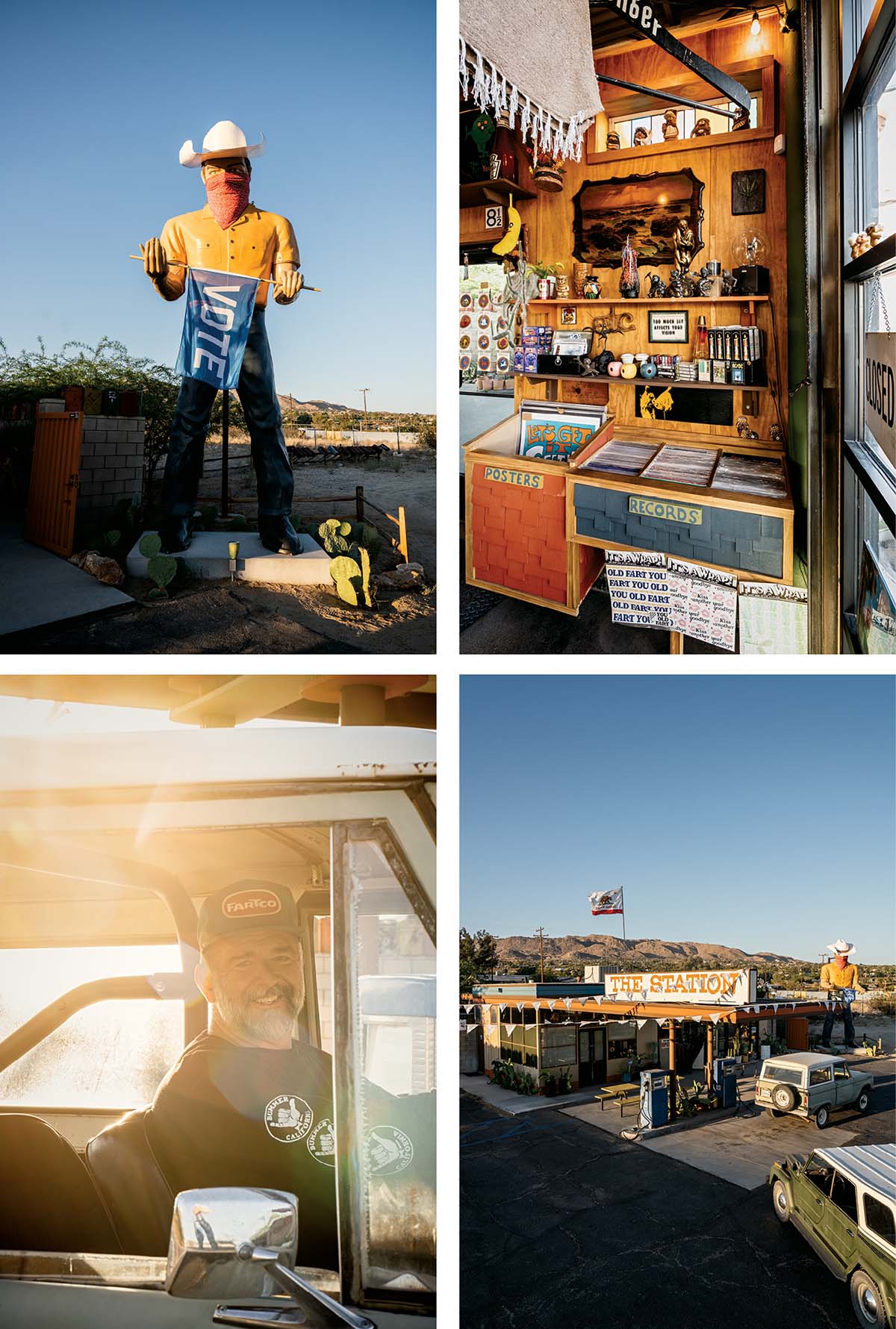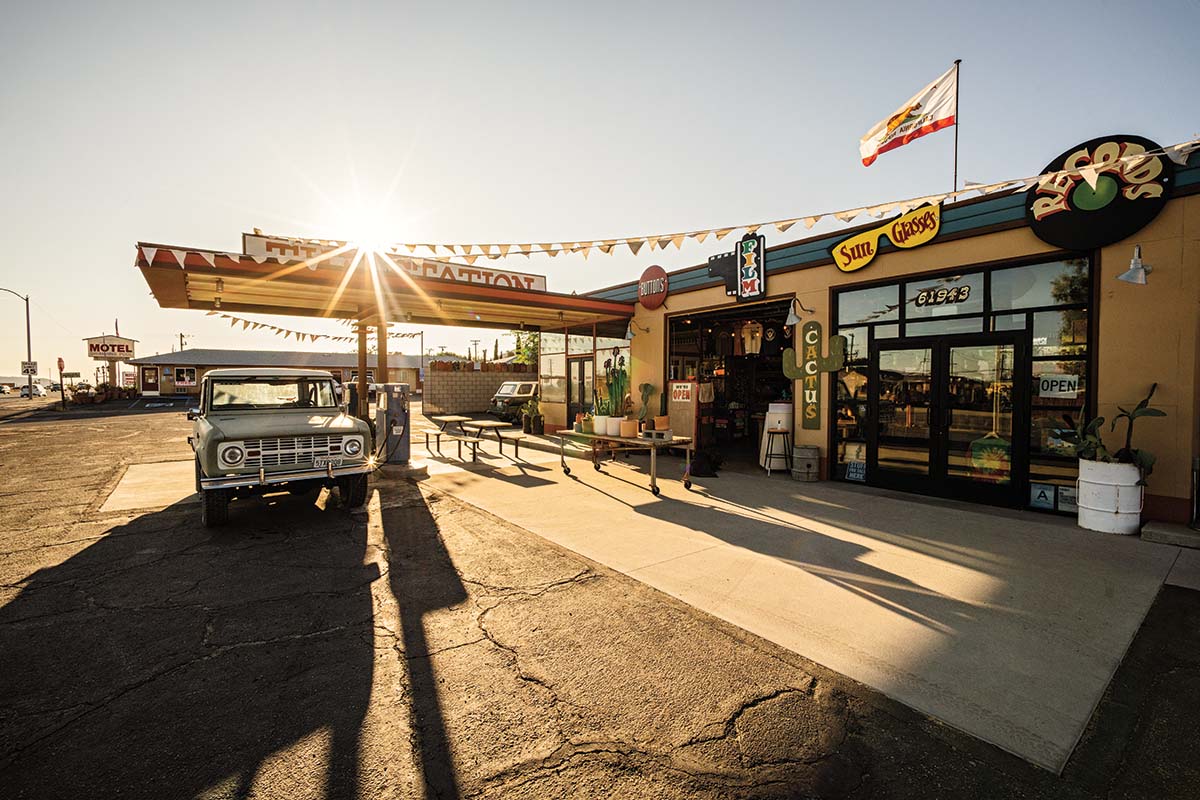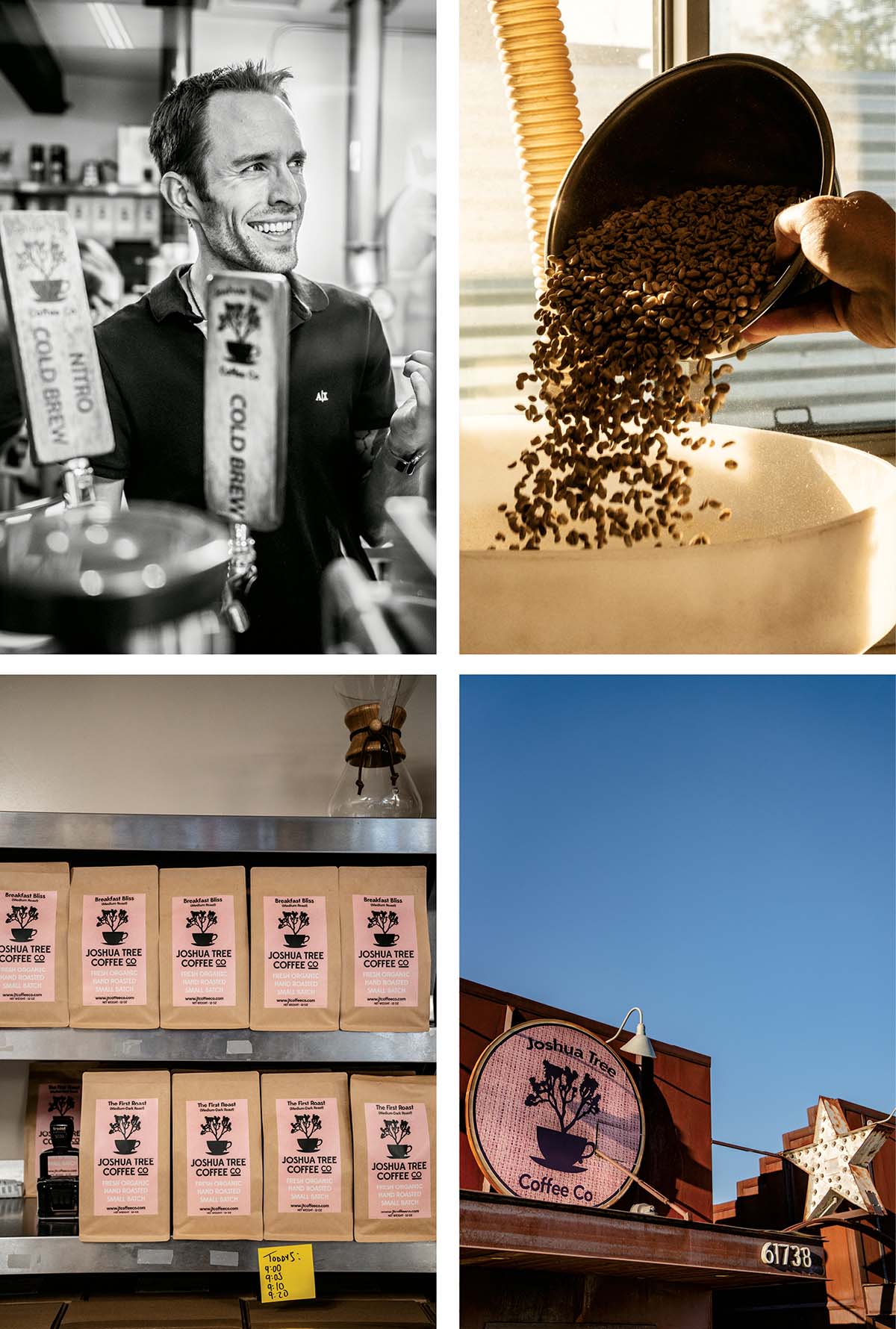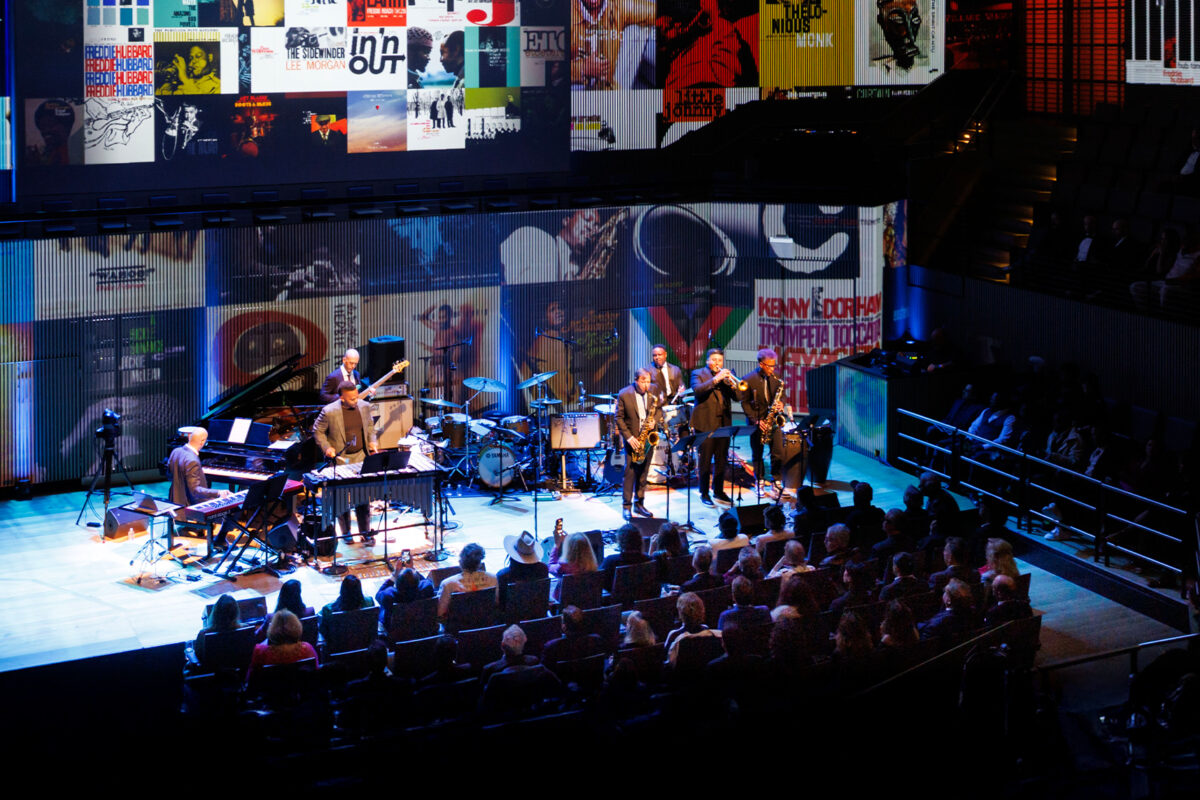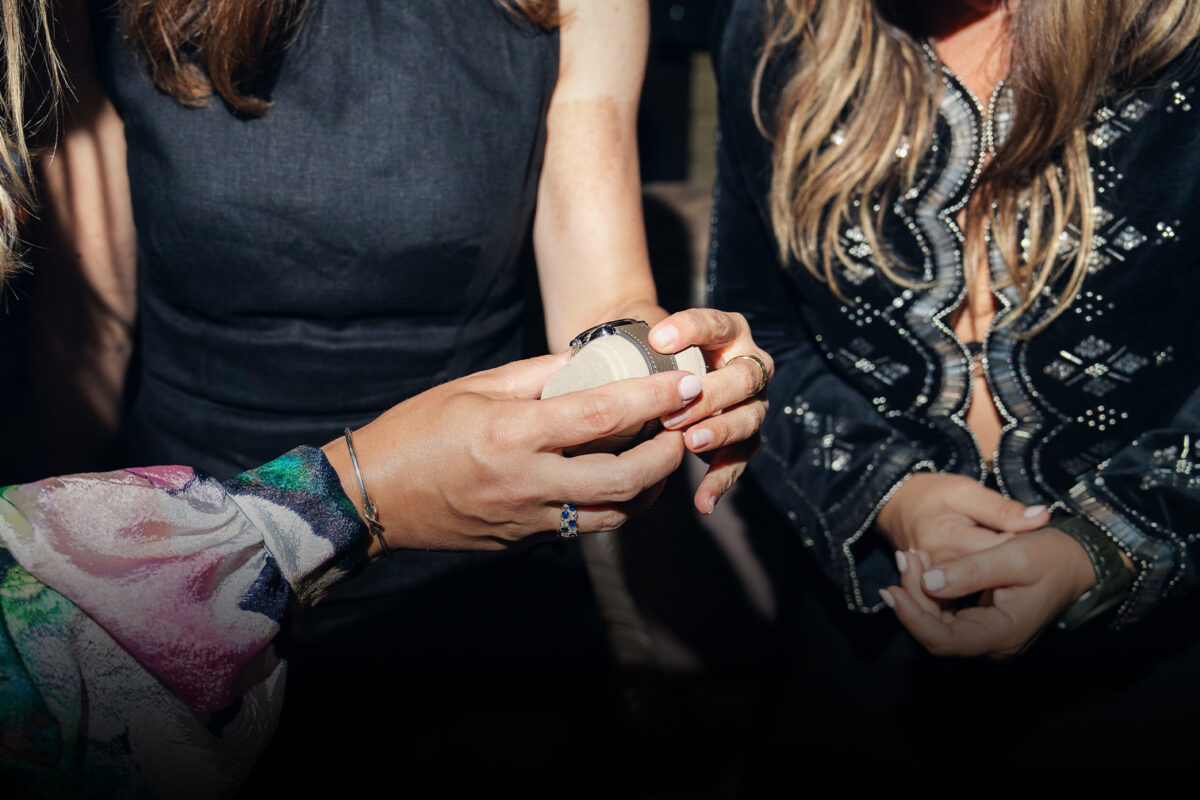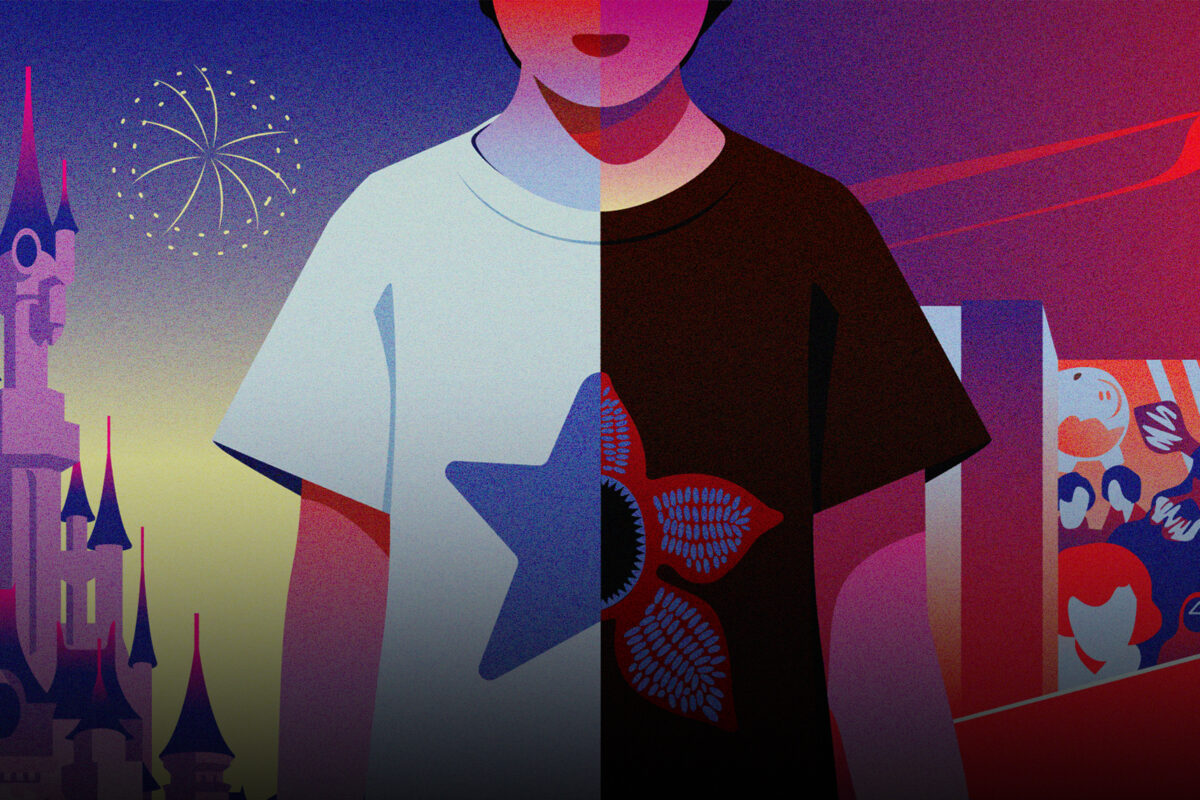Meet the creative minds bringing art and innovation to the community’s rocky plains and starry skies despite the challenges of the pandemic
Words by ANDREW BARKER
Photography by RAINER HOSCH
The dusky purple haze on the horizon, the night sky an explosion of shooting stars, the balancing boulders that wait 10,000 years to tumble, and the Joshua trees, all spiky limbs and stubby branches, a legion of headless green monsters.
There are many reasons to fall for this trippy, transcendental corner of the Mojave Desert. The evocatively named Yucca Valley, Pioneertown and Flamingo Heights have long been a refuge for bolters from the big smoke and musicians in search of a muse. Its quiet beauty and otherworldly energy is a giddy high for the lost and languorous.
A wagon in Pioneertown.
But in the past few years, savvy entrepreneurs and sought-after artisans have settled in with the dreamers and drifters, snapping up second homes and opening small businesses on the stretch of Highway 62 connecting the windmills of Palm Springs with the military base at 29 Palms. Since the pandemic hit in March, the population has swelled as many of these weekenders have become primary residents. For these desert dwellers, the testing times have not only instilled an even greater desire for a life in the great outdoors, but also forced them to pivot their purposes, revealing some unexpected silver linings in the process.
Take Ben Adams, a co-proprietor of the now shuttered Know Where Bar in Hollywood. With the owners (his former business partners), Aric Christopher and Alex Meza, they’ve unveiled Know Where Ranch, an events space and rental property in Pioneertown which echoed the same “personal, in your own home kind of feel,” according to Adams, as their sleek drinkery on Hollywood Boulevard.
Clockwise from top left: KNOW WHERE RANCH is filled with murals by PENELOPE MISA. The entrance and a close-up of a colorful mural at the ranch. The property’s vinyl collection and record player.
Once COVID-19 hit and the mandatory closure orders were issued by the city, the trio couldn’t come to an agreement with their L.A. landlord on a renegotiated rent. So they gave up the lease but hung on to the 20-foot bar, intending only to store it at the ranch. “We were super lucky. Our wood worker who built the bar seven years ago helped us break it apart and then rebuild it in the desert,” Adams says. It now stands proud in a wall-less barn, illuminated by pink neon, the refracted shards of a disco ball and, once a month, a blinding full moon.
The 20-foot bar at KNOW WHERE RANCH is the very same bar that previously stood at KNOW WHERE BAR on Los Angeles’ Hollywood Boulevard, which closed at the start of the pandemic.
With its infinity pool, original 1950s Airstream and 3 acres, Know Where Ranch has hosted city escapees and wedding parties throughout the course of the pandemic, allowing the partners to look at upcoming opportunities, including Joliet, a new restaurant and bar that will open in the Free Market retail development at Runway Playa Vista (as it happens, next to a beach-inspired Studio C store from C Magazine).
Know Where Ranch is a slingshot away from Pioneertown proper, the storied spaghetti western film set, replete with a pseudo “bank” and “bath house,” opened in the 1940s to offer a more economical alternative to the faux frontier towns of the Hollywood Studios. Standing on a corner spot on Mane Street, the Red Dog Saloon had been variously used over 40 years as a film location, a hideout for Hell’s Angels and a fully functioning bar, but it had lain pretty much dormant for 35 years until this past summer when Jeffery Baker and a group of friends (including the owners of the Pioneertown Motel) decided to revive it.
Clockwise from top left: THE RED DOG SALOON’s original sign. JEFFERY BAKER at the saloon. A water tower in Pioneertown. The scenic Pioneertown Road.
“It’s a feeling. A return to a small community where people care and participate”
Jeffery Baker
“The Red Dog has always been a part of the legend and the lore of Pioneertown since the community’s inception,” Baker says. Indeed, its history is writ large in etchings and graffiti on the bar’s original wooden top, the preservation of which was a condition of the new lease. Serving beer, cocktails (both fresh and to-go options that are canned on-site), and an enviable selection of mezcals and whiskeys, it is an old-fashioned watering hole with a contemporary libations list (Baker et al. know their stuff, having spent decades at the forefront of events and hospitality, two sectors which have been hit the hardest this year).
The desert sky as seen from KNOW WHERE RANCH.
“We are privileged to be the stewards of this chapter of its existence,” says Baker, an Indiana native who’s set to become a full-time desert resident. Of his new home, he says: “It’s a feeling. A return to a small community where people care and participate in what’s going on around them. The view also helps — it’s a front-row seat to the Milky Way.”
For Cathedral City’s Ashley Busenius Coy and her partner Glen Coy, the pair behind Windmill City Screen Printing, the pandemic has had its ups and downs. They have spent the past six years supplying printed T-shirts, totes and bandannas, embroidered hats and towels, branded mugs and enamel pins to clients from salons to vegan restaurants, and fitness studios to breweries across the Coachella Valley, all the way to Los Angeles.
Clockwise from top left: ASHLEY BUSENIUS COY and GLEN COY, owners of WINDMILL CITY SCREEN PRINTING. The San Gorgonio Pass wind farms. The printing company’s latest work and the exterior of its headquarters.
“Our clients are small businesses and are the contributing factors to the desert’s culture, high and low”
Ashley Busenius Coy
“The majority of our clients are small businesses and are the contributing factors to the desert’s culture, high and low,” Busenius Coy says with pride. But as the shelter-in-place order was imposed, the orders dried up. Spotting an opportunity, they made a quick shift to making masks. For eight weeks, they employed a dozen local seamstresses to create thousands of face coverings, providing the means to keep their business afloat. As San Bernardino County relaxed restrictions, regular orders have picked up and they expanded to a second premises in October. Located in the heart of downtown Palm Springs, the shop is called Windmill City Super #1.
“March and April are two of our busiest months and most businesses came to a complete standstill. Business is now back to ‘normal,’ and sales have continued to increase year over year as we hire new staff,” Busenius Coy adds.
MARISCAL CACTUS & SUCCULENTS in Desert Hot Springs.
One of Windmill’s clients is The Station, a restored gas station bought by Joshua Tree transplants Glen Steigelman and his partner in life and love, Steve Halterman. It opened two years ago as a “part souvenir, part vintage and nostalgia, part record shop, as well as a place where you can buy a cute potted cactus and have a cold drink. … The whole store is basically a collection of items that we like or things made by the great artists and creative people we call friends,” Steigelman says.
Big Josh figure at THE STATION. Records and curios on sale inside. The 1940s exterior. Co-owner GLEN STEIGELMAN.
A must for visiting Instagrammers and a mainstay for repeat patrons, the 1949 modernist outpost is arguably Joshua Tree’s most photogenic site after the park itself. “Because of the large roll-up service bay doors and the large outdoor covered patio, we are now able to have customers enjoy the space safely, masks totally required of course,” Steigelman continues. When they are not in the shop or have closed it for intimate weddings or yoga classes, the pair have been remodeling their home in a boulder field on the fringes of the national park.
On Highway 62, just past the turn for Joshua Tree National Park as one drives east, stands THE STATION, a restored 1949 gas station converted into a store and events space that sells vintage souvenirs and other nostalgia.
“At the very beginning, things were very uncertain, as I immediately received a wave of cancellations due to the fact that California was the first state to close things down,” says private chef and Joshua Tree resident Grecia Parra, who specializes in the cuisine of her mother’s native Michoacan province, with a touch of the Julia Child recipes she obsessed over while growing up in Southern California. “A ban on short-term rental properties severely impacted my clientele. As I settled into this new reality, I’ve been fortunate that much of my business, if not more, has bounced back much more quickly than anticipated,” she adds.
Clockwise from top left: Chef GRECIA PARRA prepares a dish of Michoacan origin. An employee tends to plants at MARISCAL CACTUS & SUCCULENTS. Parra’s scallop ceviche. The sign for LA COPINE restaurant in Flamingo Heights.
“Although some procedures have changed during the pandemic, the quality of the food I prepare has always remained the same”
Grecia Parra
Parra relies on the Joshua Tree farmers market every Saturday for fresh fruit and vegetables. Sourcing meat involves a drive “down the hill” through Morongo Valley to Whole Foods in Palm Desert, and for seafood it’s all the way to the Santa Monica fish market. “Although some procedures have changed [during the pandemic], the quality of the food I prepare has always remained the same,” Parra says.
Clockwise from top left: JOSHUA TREE COFFEE COMPANY owner and roastmaster ROYCE ROBERTSON. Coffee beans are roasted on-site. The brand’s headquarters and freshly packed goods.
With the uptick in local commerce and the influx of full-time residents, Parra is cautiously optimistic for the future: “I am taking things day by day. I hope our small desert community continues to thrive and, who knows, maybe a transition to a brick-and-mortar Mexican restaurant is in the cards,” she ponders.
Such exposure can have its downsides as Adams points out: “Because of COVID, so many people are exploring different areas of Cali. I hope it can keep its small-town charm going forward.”
But for small businesses on the bounce-back, right now it’s probably the best kind of problem to have.
Feature image: The Airstream at KNOW WHERE RANCH.
This story originally appeared in the Fall/Winter 2020 issue of C Magazine.
Discover more CULTURE news.
